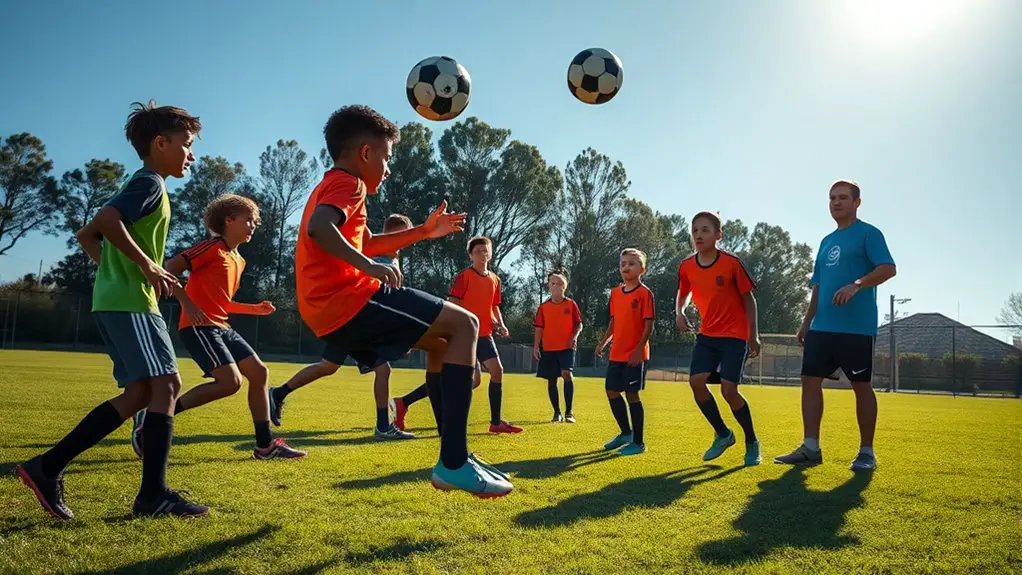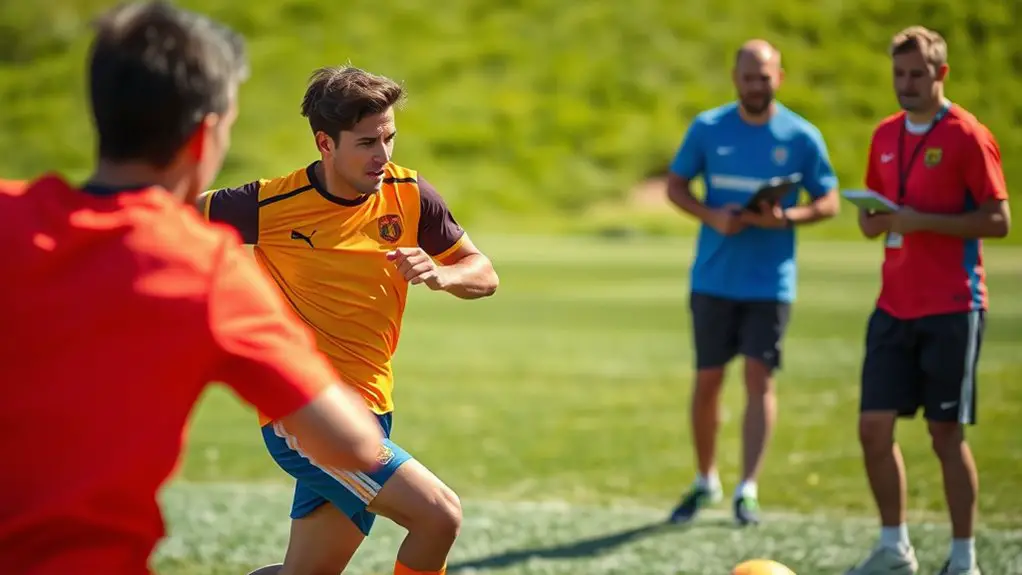To improve your timing and anticipation of passes in sports, combine physical drills with mental techniques. Focus on reaction time exercises like catching a tennis ball or agility ladder drills. Sharpen your situational awareness by visual scanning and analyzing game footage. Enhance communication with teammates using hand signals and verbal cues. Don't forget about mental training techniques, including visualization and grounding exercises. These strategies will help elevate your game, and there's even more to discover.
Understanding Timing and Anticipation in Sports
When you step onto the field or court, understanding timing and anticipation can make all the difference in your performance. Mastering timing mechanics means recognizing the rhythm of the game and syncing your movements with your teammates and opponents. It's about feeling the flow and knowing when to act, whether you're passing, shooting, or defending.
Anticipation techniques help you predict what'll happen next, enabling you to react quicker than your rivals. By observing body language and patterns, you can gauge their intentions. Incorporating reaction time drills into your practice can significantly enhance your ability to make those split-second decisions.
Combining these skills gives you the freedom to play with confidence, allowing you to make split-second decisions that can turn the tide of the game. So, focus on refining your timing mechanics and honing your anticipation techniques. This way, you'll not only elevate your own game but also inspire your team to rise to the occasion, creating a dynamic and exhilarating environment on the field or court.
Drills to Improve Your Reaction Time
Improving your reaction time is key to enhancing your timing and anticipation on the field or court. You can achieve this through various reaction drills that challenge your reflexes and decision-making. Start with simple exercises, like catching a tennis ball tossed at you from different angles, which sharpens your hand-eye coordination.
Next, try agility ladder drills, focusing on quick foot movements while reacting to visual or auditory cues. Incorporating a partner can elevate your reflex training; have them call out directions or throw objects for you to catch.
Using a reaction ball, which bounces unpredictably, can also heighten your responsiveness. Finally, don't forget to mix in fun games like ping pong or speedball, which naturally enhance your speed and reaction times. By consistently practicing these drills, you'll feel more in control and ready to seize opportunities on the field. Additionally, incorporating mental training techniques such as visualization can further sharpen your reactions and decision-making abilities.
Developing Situational Awareness
To excel in any sport, you need to develop situational awareness, which allows you to read the game and anticipate plays before they unfold. By honing in on situational cues, you can make quicker decisions and elevate your performance.
Here are some effective awareness exercises:
| Exercise | Purpose |
|---|---|
| Visual Scanning | Identify key players |
| Anticipation Drills | Predict ball movement |
| Reaction Games | Enhance quick thinking |
Incorporating these exercises into your training routine can sharpen your instincts. Focus on the details around you during practice and games. Notice how players move and the patterns that emerge. This freedom to react instinctively comes from being present and aware, enabling you to seize opportunities. Trust your instincts, and you'll see how your awareness translates into better timing and anticipation on the field. Additionally, practicing mindfulness in athletic performance can further enhance your ability to tune out distractions and remain focused on the game.
Enhancing Communication With Teammates
Effective communication with teammates can greatly elevate your performance on the field, as it fosters trust and understanding among players. To enhance this crucial aspect, consider these strategies:
- Develop Teammate Signals: Create specific hand signals for various plays. This allows for quick, silent communication during intense moments.
- Use Verbal Cues: Establish concise phrases or words that convey your intentions. This helps teammates anticipate your movements without confusion.
- Practice Together: Regularly engage in drills that emphasize communication. The more you practice, the more instinctive your signals will become.
- Encourage Feedback: After games or practices, discuss what worked and what didn't. This open dialogue strengthens your bond and refines your communication strategies. Additionally, incorporating mindfulness practices can help you stay focused and enhance your communication during high-pressure situations.
Analyzing Game Footage for Improvement
Building on the communication techniques you've developed with your teammates, analyzing game footage can further sharpen your timing and anticipation on the field. By conducting a thorough game analysis, you can identify patterns and tendencies that help you predict your teammates' movements, leading to more fluid gameplay. A performance review of your games allows you to pinpoint both strengths and areas for improvement.
| Strengths | Areas for Improvement |
|---|---|
| Quick decision-making | Anticipation of passes |
| Effective positioning | Timing of runs |
| Strong teamwork | Communication on the field |
| Adaptability | Reading the opponent's plays |
Utilizing big data analytics can enhance your understanding of both your performance and that of your teammates. Use this footage to fuel your passion for the game, empowering you to play with freedom and confidence. Embrace the insights you gain, and watch your timing and anticipation soar.
Incorporating Mental Training Techniques
To enhance your timing and anticipation, incorporating mental training techniques is essential. You can use visualization strategies to picture successful plays, practice mindfulness to stay present, and employ focused breathing to maintain calmness under pressure. These techniques can sharpen your mental edge and improve your overall performance. Additionally, integrating meditation techniques can help athletes access their full potential without stress burdens.
Visualization Strategies
As you train your mind to enhance timing and anticipation, visualization strategies can play an essential role in your development. By using effective visualization techniques, you're able to create mental imagery that sharpens your skills. Here are four strategies to incorporate:
- Game Simulation: Visualize yourself in real game situations, focusing on anticipating passes.
- Success Scenarios: Picture successful plays where timing and anticipation lead to positive outcomes.
- Body Awareness: Imagine your movements flowing naturally as you receive and pass the ball.
- Feedback Reflection: Visualize moments of feedback to adjust your timing and enhance your game.
These practices nurture your mental agility, allowing you to move freely and confidently on the field. Embrace these techniques, and watch your anticipation soar!
Mindfulness Practices
While enhancing your timing and anticipation, incorporating mindfulness practices can greatly elevate your mental training. Mindful breathing anchors you in the present moment, allowing you to tune into your instincts, which can make all the difference during a game. Here's a quick overview of mindfulness techniques you can easily adopt:
| Technique | Description |
|---|---|
| Mindful Breathing | Focus on your breath to center yourself. |
| Body Scan | Notice sensations in your body. |
| Visualization | Picture successful passes in your mind. |
| Grounding Exercise | Connect with your surroundings. |
| Affirmations | Repeat positive statements to boost confidence. |
Focused Breathing Techniques
Focused breathing techniques are essential tools for honing your timing and anticipation in high-pressure situations. They help you stay grounded and clear-minded, leading to better performance enhancement. Here's how to practice them effectively:
- Inhale Deeply: Take a slow, deep breath through your nose, filling your lungs completely.
- Hold: Pause for a moment, allowing the oxygen to energize you.
- Exhale Slowly: Release the breath gently through your mouth, letting go of tension.
- Repeat: Continue this cycle for a few minutes, focusing solely on your breath.
Frequently Asked Questions
How Can I Measure My Improvement in Timing and Anticipation?
You might feel uncertain about how to gauge your progress. Start by using video analysis to review your gameplay, capturing those moments where timing matters most. Then, set specific benchmarks during practice drills—like tracking your successful passes or intercepts. Over time, compare your stats to see growth. With each session, you'll discover a newfound freedom in your ability to anticipate, transforming uncertainty into confidence as you embrace the game.
What Are Common Mistakes Players Make in Timing and Anticipation?
When it comes to timing and anticipation, players often make common mistakes like poor positioning and slow reaction time. You might find yourself too far from your teammates or not reading the play quickly enough, missing those vital moments to intercept or receive a pass. It's important to stay aware of your surroundings and trust your instincts to improve. Embracing these lessons can free you to play with confidence and creativity.
How Does Physical Fitness Affect Timing and Anticipation Skills?
Think of physical fitness as the engine of your performance; without it, you're just idling. Your physical conditioning not only boosts endurance but also sharpens your cognitive training, helping you read the game better. When you're fit, you're quicker to react and anticipate plays, giving you the freedom to make split-second decisions. So, invest in your fitness—it's the key to revealing your true potential on the field.
Can Timing and Anticipation Skills Be Learned at Any Age?
Absolutely, timing and anticipation skills can be learned at any age! With age-specific training, you can enhance your skill development, no matter when you start. It's all about your willingness to learn and practice. Embrace the journey, and don't let age hold you back. Whether you're young or older, tapping into your potential can lead to significant improvements in these essential skills, giving you the freedom to excel in whatever you pursue.
What Role Does Intuition Play in Making Accurate Passes?
You might not realize it, but your intuition is a powerful force in making accurate passes. It's that gut feeling guiding your instinctual decision-making when the game's pace quickens. As you develop your intuition, you'll find it shapes your understanding of the game, allowing you to anticipate movements effortlessly. This connection between instinct and awareness creates an exhilarating freedom on the field, pushing you to trust what feels right in the heat of play.




